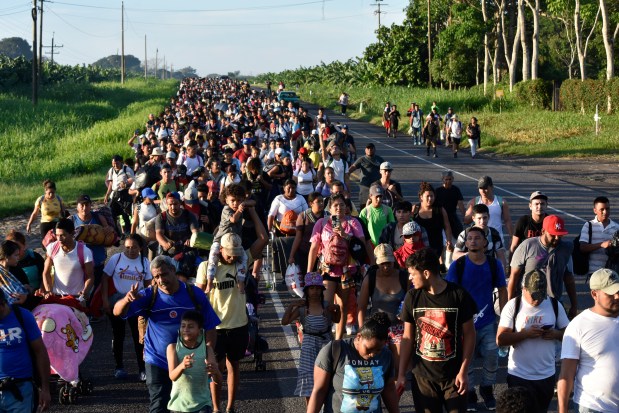Chicago is bracing for as many as 25,000 migrants to arrive by bus ahead of the Democratic National Convention, city leaders said Tuesday.
The high-end estimate from Deputy Mayor of Immigration Beatriz Ponce de León came as Mayor Brandon Johnson’s administration defended its policy of evicting migrants who stay in city shelters longer than 60 days. That removal policy could be much needed if Republican Texas Gov. Greg Abbott holds true on promises to send Chicago many more migrants in the next few weeks in order to try to make the migrant crisis a Democratic problem, she argued.
“We need that cushion of available beds. We need to be prepared for any growing number,” Ponce de León told aldermen at a Tuesday meeting of the City Council Committee on Immigrant and Refugee Rights.
The “fully expected” surge would be in sharp contrast with the current migrant count. The number of people living in city migrant shelters has steadily declined for months — down from around 15,000 in December to 5,667 Monday — and costs have fallen too.
But leaders have long feared the possibility of a pre-DNC spike in buses and planes like the ones that have carried over 45,000 migrants to Chicago over the past two years. Those worries only grew last week when Abbott touted the effort at the Republican National Convention.
“Those buses will continue to roll until we finally secure our border,” Abbott said.
Ponce de León added that the city’s concerns about the massive influx “is all speculation.” For now, President Joe Biden’s June executive order limiting asylum-seeker arrivals is sharply curtailing the border crossings that ultimately led people to Chicago, she said.
But if Biden’s policy were lifted by his administration or struck down by judges hearing ongoing legal challenges, the buses would surely increase, she added.
“We just need to be prepared,” Ponce de León told reporters after the hearing. “We will be ready. We have the plan in place.”
In the event of a surge before and during the convention, which starts Aug. 19, the city would first house new arrivals with its roughly 5,000 available beds, Ponce de León said. If that’s not enough, a mix of city, county, state and federal funding would open several “just-in-time” shelters,” she added. “Everything to be able to open these beds very quickly is beginning to fall into place,” Ponce de León said.
Gov. J.B. Pritzker’s administration announced earlier this month that it would open two new shelters capable of housing 1,700 migrants, but downplayed the timing ahead of the DNC.
The city has spent $434 million paying vendors for migrant services over the last two years, according to its website. As Chicago, Cook County and Illinois spend big, the federal government has failed to meaningfully pay for the “federal responsibility,” Ponce de León told aldermen Tuesday.
She praised Chicago’s migrant caretaking efforts as more generous than other cities receiving thousands of arrivals, such as New York City and Denver. Chicago’s 60-day policy — which she later argued is not an eviction — offers a longer stay than other cities, Ponce de León said.
The evicted residents can return to Chicago’s migrant landing zone and request a new shelter accommodation, she added. While 1,511 people have been removed from a shelter because of the 60-day policy, 955 have then re-entered the shelter system, city data shows.
“We could have ignored it and let people fend for themselves and probably ended up with a massive problem of people unsheltered and unhoused, but we chose to live in the values of the administration and this city,” Ponce de León said.
But aldermen found fault in the city’s efforts during the Tuesday hearing, criticizing parts of the response such as ambiguous mechanisms for migrants to make complaints about poor treatment and a lack of transportation to downtown for evicted shelter residents.
Ald. Andre Vasquez, 40th, the Immigration Committee’s chair, called the meeting in an effort to push the city to get rid of the shelter time limits. No votes were taken Tuesday on his ordinance to end the 60-day policy.
Vasquez joined other Latino Caucus aldermen to ask Johnson to stop the 60-day eviction policy in June when the mayor’s administration ended a school year exemption to the rule for families.
In the days that followed, Johnson administration leaders told Latino aldermen they were pushing the state and county to again relax rules on families, but Ponce de León said Tuesday the administration has since decided that no such exemption would be made.
But Ald. William Hall, 6th, called Vasquez’s bid to end the 60-day policy “misguided energy.” He backed the mayor’s long-term plan to unite the city’s standard homeless shelter system with the migrant shelters. It is unfair that the city has 5,000 empty beds at migrant shelters, but does not always have space for people who are from Chicago and homeless, he said.
“Anyone that doesn’t have a place to stay should never be turned away,” Hall said. “We have energy to fight for the unhoused that are coming from the border. We need to have that same energy for those who are unhoused from any side of the city.”
jsheridan@chicagotribune.com




